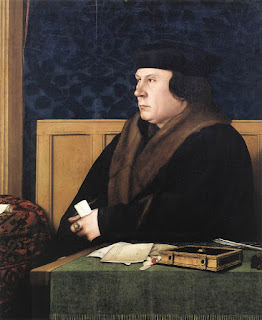In the last post, about a Pakistani interloper, I made mention of a "hefty historical novel" on which I was embarked and which the subcontinental tale briefly interrupted. So I now reveal that Wolf Hall was the novel in question, and its heftiness 674 pages in my paperback edition.
But, lest we forget, Wolf Hall is not primarily history; it is a novel. The characters are, for the most part, Mantel's (yes, probably rather well informed) imaginings of historical figures: Henry VIII, Katherine of Aragon, Anne Boleyn, Mary Tudor, Cardinal Wolsey, Thomas More, Hans Holbein, and, principally, Thomas Cromwell, by the end of the book the King's first minister and general fixer. All these characters, and many more, come to life in Mantel's rendition of them, but the heart of the novel is Thomas Cromwell, through whose eyes we perceive just about everything.
 |
| Thomas Cromwell, by Hans Holbein |
 |
| Thomas More, by Hans Holbein |
In Mantel's hands, Cromwell emerges from the evil stereotype as a much more interesting and, yes, sympathetic character. His early life, which largely escaped historical record, but was certainly humble, is portrayed as an escape from a brutal father (a childhood beating opens the book) and, in a series of flashbacks throughout the story, as an international progress through hard knocks in war and business, which leave Cromwell with his eyes wide open as to how things get done in the real world, some practical skills best not advertised, a very shrewd head for business, an international world view and a discreet sympathy for protestant reformers in Germany and the Netherlands. Indeed, Cromwell despises the superstition and corruption which to great extent characterise the Church of his age, an attitude which underpins most of what he subsequently does - not all of it very palatable, to be sure - for the King. He is also portrayed as humane and rational, in an almost pre-Enlightenment manner, in his dealings with others, heading a full and happy home, generally able to overlook small heresies or suitably measured opposition to change, and to strike a reasonable deal.
 |
| For completeness, the King, Holbein again |

Good review. That said TC was a nasty piece of work.
ReplyDelete